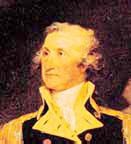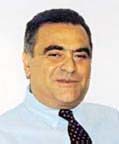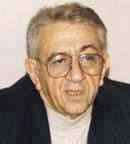|

Autumn 1998 (6.3)
Page 15

  Loving Too Much, Hating Too Much Loving Too Much, Hating Too Much
"The nation which indulges towards another habitual hatred
or habitual fondness is to some degree a slave. It is a slave
to its own animosity or to its own affection - either of which
is sufficient to lead it astray from its duty and its interests."
George Washington, first
President of the United States, in his Farewell Speech at the
conclusion of his second term of presidency in 1796. Washington
was particularly referring to the United States, then a "third-world
country," in its relationships with England and France.
Now, more than 200 years later, his words still ring true in
regard to the Caucasus and Caspian regions.
  Protecting Biodiversity Protecting Biodiversity
"We live in such a strange world. Billions of dollars are
spent to protect the biodiversity of our planet by protecting
wild animals, rare plants and even the tiniest insects. But where
do human beings fit into the picture? So often the world sits
idly by, watching ethnic conflicts flare up, as if these were
mere entertainment rather than human beings whose lives are being
destroyed. Shouldn't the existence of even one single refugee
be a cause for alarm throughout the world?"
Urkhan Alakbarov, geneticist,
in an interview with Azerbaijan International, emphasizing that
the deepest concern of science must always be mankind. Alakbarov
was referring to the tragic situation that exists in Azerbaijan
where nearly 1 million people live as refugees in a population
of 7.5 million.
  Good Neighbors Good Neighbors
"The condition of war and lack of any settlement greatly
damages both Azerbaijan and Armenia. However, Azerbaijan has
more potential than Armenia. If the status quo continues, Azerbaijan
will achieve much more than Armenia. This is obvious. But I would
not like to have Armenia as a starving, embittered and "armed-to-the-teeth"
neighbor. It is in the best interests of both of our countries
to reach peace and develop together rather than annihilate each
other."
Vafa Guluzade, Foreign Affairs
Advisor to President Heydar Aliyev, in an interview with the
Armenian news service Snark on June 16, 1998.
  The Human Heart and Peace The Human Heart and Peace
"The human heart yearns for peace and love and freedom.
Peace heals, elevates, and invigorates the spirit. Peace represents
the health of humanity. To achieve peace, we must enlist our
highest moral instincts. We must pledge, in the deepest recesses
of our hearts, to respect others as we wish to be respected and
to use good reason, persuasion, and good will, and not resort
to a war of words or arms to influence opinions and policies.
To achieve peace will require a powerful will, scrupulous character,
steadfast courage, dogged discipline, and a passionate devotion
to the noblest human principles. But the rewards more than justify
our unremitting effort, for peace permits each of us to move
forward, unimpeded, to improve humanity's lot."
Michael E. DeBakey, 90, the world's most famous heart surgeon,
has just returned from Azerbaijan in August, where he met with
President Aliyev to discuss plans for the establishment of a
Medical Heart Center in Baku. DeBakey is Chancellor Emeritus
at Baylor College of Medicine in Houston, Texas.
  Seeds of War Seeds of War
"No country recognizes Karabakh's independence. This is
U.S. policy and it is the policy of the OSCE [Organization for
Security and Cooperation in Europe]. In other words, all of these
countries [53 out of 54 - except Armenia] recognize the territorial
integrity of Azerbaijan, and that Karabakh is within the borders
of Azerbaijan. Unless you want an unending future of conflict,
tension and periodic wars, we urge that you talk to Azerbaijanis
and the three sides reach a 'modus vivendi.' No side can win
100 percent. As I said, there is not even a dialogue, much less
any progress toward an agreement [these days]. We believe that
Armenia cannot realize sustained, robust economic growth unless
there is a solution to the Karabakh dispute.
"As I leave Armenia, I urge you not to become complacent
and think that everything is OK - it is not OK. The seeds of
war are there. You should try to remove them through political
negotiations...If there is no political negotiation, inevitably
military tensions and military buildups go forward, eventually
leading to another conflict and war. And then the process starts
all over again."
Peter Tomsen, at a press
conference in Yerevan, Armenia, on August 20, 1998, on the completion
of what he described as "three wonderful years" as
U.S. Ambassador to Armenia.
From Azerbaijan International (6.3) Autumn 1998.
© Azerbaijan International 1998. All rights reserved.
Back to Index
AI 6.3 (Autumn 1998)
AI Home |
Magazine
Choice
| Topics
| Store
| Contact
us
|






